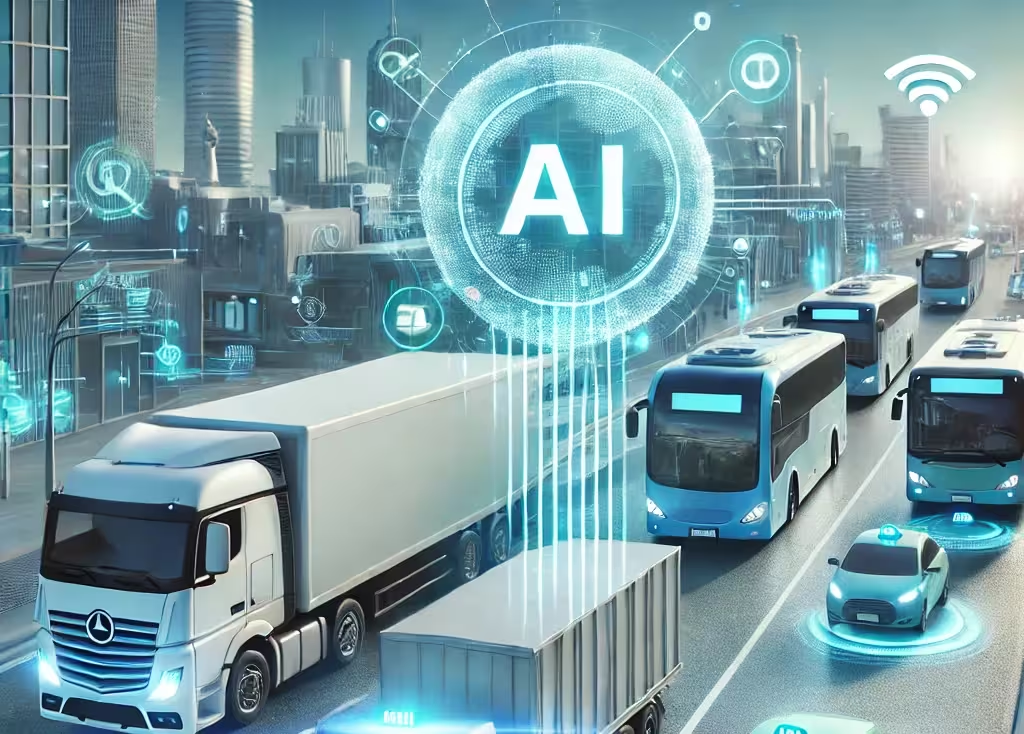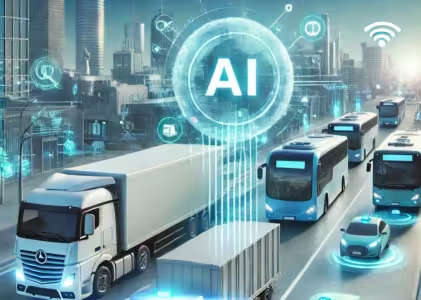AI is Revolutionizing Fleet Management – Imagine this: a city bus system in which routes and timetables automatically adjust themselves on real-time traffic to minimize delays and keep everyone on schedule.
Or a delivery fleet that knows exactly how to avoid fuel-wasting traffic, cuts down wear and tear and keeps drivers safe. It may sound futuristic, but this is today’s fleet management reality with AI.
Here, AI has a revolutionary impact, touching on benefits in logistics, safety, and cost savings factors in which even a small improvement can make a huge difference.
What Exactly Is Fleet Management, and Why Is It So Important?
Fundamentally, the very basis of fleet management rests on how well the company’s fleet of vehicles is organized and coordinated for efficiency and cost reduction, with safety in mind.
Generally speaking, it is a chess game involving logistics, with vehicles taking the place of pieces. Companies operating delivery trucks, taxis, buses, and/or company cars depend on fleet management to ensure smooth operations, safe drivers, and low expenses.
How Does AI Improve Logistics in Fleet Management?
AI’s Power of Prediction
One of AI’s superpowers is its power of prediction. With machine learning, a type of AI that learns through the data it gathers, AI can foresee traffic flow and patterns, weather conditions, and even impending mechanical failure.

Thereby, fleet managers could address delays before they happen. For instance, AI can analyze past traffic data to suggest the most efficient route and save not only time but also fuel. It’s like having a GPS that knows not only where the roads are but what the best route is right now.
Route and Schedule Optimization
Now, imagine the system reassessing routes in real-time as soon as it detects an accident or congestion along a route considered. AI does just this.
By leveraging real-time data analytics, AI makes sure that much of the time is spent making deliveries or moving people around, rather than just idling in traffic. This not only saves time but also cuts fuel costs and carbon emissions, making the operation of a fleet of vehicles much greener.
Can AI Make Fleet Management Safer?
Predict and Prevent Accidents
Safety is another dimension where AI excels. Analyzing vast data-from speed patterns to driver behaviour and on-road conditions can predict what situations are at higher risk and offer drivers, real-time counsel.
For instance, if a driver continuously speeds up or slows down abruptly, the AI system flags these patterns as risky, hence serving as a warning for managers over potential safety risks before a collision can take place.
Keeping Drivers Alert and Focused
Driver fatigue remains one of the biggest causes of accidents in fleet management. Advanced AI systems use in-cab cameras to track eye movements and other behaviour indicators that denote fatigue or distraction.

When any signs of drowsiness appear, the system would alert a driver to take a rest stop and thereby help ensure the driver’s and others’ safety.
What About the Cost Savings?
Lower Maintenance Costs
Maintenance of fleets is a pretty costly affair; AI helps in ameliorating the situation by predicting when maintenance will be required.
Conventionally, vehicles are serviced according to time or mileage, but all vehicles do not wear out similarly. AI continuously monitors various parameters like driving habits, road conditions, and vehicle usage to predict when a particular vehicle is likely to need repairs.
Predictive maintenance reduces sudden breakdowns, hence extending the life of such vehicles. This saves the company thousands of dollars in repair costs over time.
Fuel Consumption Reduction
Aside from that, fuel is another significant expense for fleet operators. By using AI, vehicles can take the most fuel-efficient routes, while driving behaviours can be monitored and tracked to encourage smoother, more economical driving styles.
According to some reports, AI’s powerful fleet management systems have helped companies shave off as much as 20% in fuel costs alone. That’s money directly back into the business, helping grow it sustainably.
Are There Downsides to AI in Fleet Management?
No technology is completely perfect, and AI applied to fleet management does come with its own set of challenges.
- First, for example, is that AI systems require access to significant amounts of data, raising certain privacy concerns. The more fleets rely on AI, the greater their dependency on the system will be, and thus, the greater their vulnerability to system failure.
- Imagine how bad it would be if a fleet of delivery vehicles couldn’t move because of some sort of unexpected glitch in the software.
- Finally, there’s the possible impact on jobs. As AI handles more and more elements of fleet management, there is a shift in roles, perhaps even elimination, a thought that companies will want to present and consider with great thoughtfulness.
What’s Next for AI in Fleet Management?
As one looks into the future about how much more fleet management can achieve by way of AI, the prospects are tantalizing.

In the future, a combination of semi-autonomous or even autonomous vehicles that will further cut down the number of human drivers involved will increase the safety and efficiency of the traffic.
In addition, AI might assist fleets in speaking even better with intelligent city infrastructure to facilitate quicker, smoother journeys for one and all.
More From Us
Transformation of the transport Industry due to AI
Implementation of Data Security
Best School For Computer Science
A Beginner’s Intro to Robotics
Conclusion
AI makes fleet management smarter, safer, and cost-effective. The bottom line is that it is one avenue through which companies can remain competitive, reduce their carbon footprint, and even change the world’s thinking on logistics and transport.
Challenges aside, ethical questions are hanging in the balance, but for now, AI involvement in fleet management does look set to increase further as it pushes the industry toward a future where efficiency and safety can walk side by side.
By understanding how AI enhances fleet management, you’re not just looking at the future of transportation-you’re seeing one way in which AI approaches real-world problems whose solutions touch us all.


